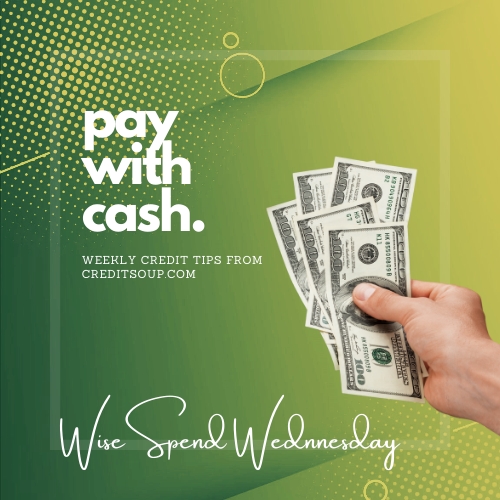February 1, 2023
• 3 Minute Read
This week's Wise Spend Wednesday talks about the importance and variances of paying with cash. Paying for things with cash definitely has it's perks. It's a handy way to monitor how much you have & don't have to spend. Some may argue that paying with cash is harder to track. While others state that it makes transactions much more seamless, without all the paperwork involved. You want something, you exchange cash, and you've bought it. Simple as that.
I'm sure most of you have seen this viral post on Facebook (original source unknown), explaining the importance of using cash. It touches on the life of a $50 dollar bill and how much the face value is after 30 transactions. If you haven't seen it, I have noted it below.
Why should we pay cash instead of a card?
You have a $50 dollar bill in your pocket. You are going to a restaurant and paying for dinner with it.
- The restaurant owner then uses the bill to pay for the laundry.
- The laundry owner then uses the bill to pay the barber.
- The barber will then use the bill for shopping.
After an unlimited number of payments, it will still remain a $50 value, which has fulfilled its purpose to everyone who used it for payment.
BUT - if you go to a restaurant and pay digitally via Card:
The bank fees for your payment transaction charged to the seller are 3%, so around $1.50, and so will be the fee of $1.50 for each further payment transaction, such as:
- The restaurant owner's laundry
- Or payments of the owner of the laundry shop
- Or payments of the barber, etc.....
Therefore, after 30 transactions, the initial $50 will exist at only $5 and the remaining $45 has become the property of the bank … due to all of the digital transactions and fees.
When this is put into perspective, imagine what each retailer is paying on a monthly basis in fees at 3% per transaction through their POS (point of sale) machine.
If they have, for example, $50,000 in sales & 90% are by Card, they are paying $1,500 in fees in ONE Month or $18,000 in a year! That $1,500 in transaction fees comes out of their income every month.
Use it or lose it. Once it’s gone we won’t get it back. Thus the reason you hear Cash is King!
Is a Cash Only lifestyle really for me?
While this is a great concept to adapt to, there are people out there that struggle at "saving" that cash, or even using it responsibly to pay bills. Instead, they spend it frivolously as soon as it's in their hand. One way to avoid that situation, is to manage it through a debit or credit card. Yes, there may be fees involved. However, it's the peace of mind you have at night knowing exactly where your money is, and how much you still have in the bank. You don't have to worry about someone stealing it. You don't have to worry about blowing it on random things, like junk food or impulse buys at the department store. Here are a few benefits of using a debit or credit card versus cash:
- Convenience. Complete transactions without having to fumble for cash, dig around in your purse or pockets for exact change, or find an ATM.
- Security. Cash is easily lost or stolen. While identity theft remains a concern for card users, they still provide more safeguards than paper, and you are not held liable for unauthorized purchases made if your card is stolen.
- Merchant Assurance. Paying with a card offers the assurance of payment. With increasing fraudulent activity out there, you never know if you're cash is fake or not.
- No bulk. Easy to carry in your wallet or purse without the extra bulk of cash bills.
- Credit Building. Using a debit or credit card, will give you a digital footprint with the banks and help determine your creditworthiness. Using cash all the time cannot be monitored. Thus, you essentially have no credit score.
In Conclusion
Yes, cash will always be king. But, it's a matter of how you handle it. There are benefits and downfalls to either side. If you decide to choose a digital lifestyle, CreditSoup has some great options for helping to manage your money. Keep following us here to learn weekly tips on saving money!

Editorial Disclaimer: Information in these articles is brought to you by CreditSoup. Banks, issuers, and credit card companies mentioned in the articles do not endorse or guarantee, and are not responsible for, the contents of the articles. The information is accurate to the best of our knowledge when posted; however, all credit card information is presented without warranty. Please check the issuer’s website for the most current information.